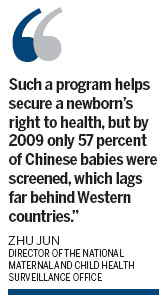Society
Bolstered newborn screening could help fight against disease
By Shan Juan (China Daily)
Updated: 2011-05-27 08:52
 |
Large Medium Small |
Chengdu - Chinese health experts called for a strengthened newborn screening program to detect congenital disorders as early as possible, which would allow timely intervention and prevent serious consequences.
"Such a program helps secure a newborn's right to health, but by 2009 only 57 percent of Chinese babies were screened, which lags far behind Western countries," Zhu Jun, director of the National Maternal and Child Health Surveillance Office, told China Daily on Wednesday.

Initiated in the 1980s in eastern provinces, the program includes testing for three disorders: phenylketonuria (PKU), hypothyroidism and infant hearing.
Funding difficulties, poor awareness and limited service capacity are among factors blamed for the low coverage, which in most Western countries is nearly 100 percent, she said.
Professor Ye Jun with the Department of Pediatric Endocrinology and Genetic Metabolism of Xin Hua Hospital said the lack of coverage was also related to local social economic situations.
"In Shanghai, the program can now cover more than 90 percent of local newborns while in many underprivileged western areas, particularly the countryside, the rate is still below 10 percent," she said.
Like in the case of PKU - a metabolic genetic disorder that, without intervention, causes mental retardation, brain damage and seizures - many gave up administering the test, which costs around 50 yuan ($7.70), she said.
Studies show the average incidence of PKU is about 0.9 out of 10,000 neonates on the mainland.
"However, only a tiny fraction of them have been diagnosed let alone been treated as even today only limited health institutions nationwide have the capacity to diagnose PKU," Ye said.
With timely detection, it can be fully controlled, she said, urging the government to push forward with the program across the country both in capacity building among medical workers and financial support for patients.
"Given that such metabolic disorders usually need lifelong treatment, the government should find ways to support the patients, especially the poor," Zhu noted.
For example, the medication for BH4 deficiency, a condition similar to PKU, costs 20,000 yuan per month for a patient. "Few could afford that on their own," she said.
Unfortunately, such conditions are not covered by national health insurance.
"We have to offer patients affordable medications," she said, calling on all stakeholders including government, enterprises and society for support.
| 分享按钮 |